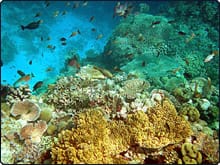The environment and climate change is a hot topic, pun intended.
At the 11th International Coral Reef Symposium held recently in Fort Lauderdale, Florida, the damage of climate change on corals was underscored. Scientists from the International Union for the Conservation of Nature discovered that of 704 reef-building coral species they could study, 32% are in danger. What is shocking is that before the 1998 global coral bleaching catastrophe, that percentage was just 2%.

This and other messages painted a grim picture of the future of the world’s corals. But the message at the symposium wasn’t all doom and gloom. A universal positive that emerged from the symposium is that there is still hope. Scientists believe that we still have a window of opportunity to, if not reverse the damage, stem its blistering pace.
One such counter measure is “reforestation” of the coral reefs, an analogy in parallel with coral reefs being likened to rainforests for its importance and diversity. Fragments of coral are cloned on a movable substrate and mature coral can then be transplanted to where it’s needed.
Artificial reefs is another way in which to create a suitable environment for coral growth. But more than coral regeneration, artificial reefs also attracts other marine life. This creates an obvious incentive and puts a fresh perspective on the benefits of building artificial reefs to support or replace reefs that once drew tourists or were sources of fish for communities.
The 11th International Coral Reef Symposium sounded loud warnings about the state of the planet’s coral reefs, but all is not lost. Through initiatives, rapidly implemented and properly managed, our coral reefs might just make it to and beyond the end of this century.